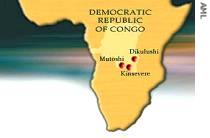2006年VOA标准英语-Congo Trial Focuses Attention on Mining Industr(在线收听)
By Phuong Tran
Dakar
14 December 2006
A court in the Democratic Republic of Congo has postponed the trial of several employees of an international mining company accused of helping government soldiers carry out a brutal 2004 crackdown against a rebel group. For VOA, Phuong Tran reports from our Dakar bureau.
 |
They are charged with committing war crimes against civilians during an 2004 army crackdown against rebels in Congo's mineral rich Katanga region.
On Thursday, the military court adjourned the trial until the end of the month because the defense team was not able to notify three indicted mining company employees, who did not attend the trial.
The prosecution team has accused the soldiers of rape, looting and summary executions of civilians. Anvil Mining Company, which has its headquarters in Canada and Australia, as well as an office in the DRC, is accused of helping the soldiers commit war crimes.
Dozens of civilians were reported killed in the fighting in October 2004 in the small fishing town of Kilwa.
The company was mining copper near Kilwa at the time of the alleged crimes. Legal counsel for the prosecution, Richard Meeran, describes how the mining employees assisted the soldiers.
"Vehicles of the company had been used by the military in carrying out human rights atrocities,' said Richard Meeran. "In particular, the company's charter planes had been used by the military to fly into the area and trucks owned by the company had been used by the military."
The company has admitted that it provided transportation to Congolese soldiers to get to Kilwa in 2004. Anvil's spokesman based in Canada, Robert La Vallière, did not respond to request for comment for this report.
Canadian media has quoted him saying that Anvil's employees were forced to give in to the Congolese government request. He is quoted as saying in an Ottawa newspaper that if the army arrives with AK-47s, you give them what they want.
Patricia Feeney is Executive Director of Rights and Accountability in Development, a British-based NGO that has been working on mining issues in the DRC since 2002. Her organization worked for two years with an international team of lawyers, human rights organizations and U.N. officials to bring this case to trial.
"We want to see justice done for the people of Kilwa and we want it to be made clear where companies have to draw the line in their relations with security forces," said Patricia Feeney.
Prosecution team member Richard Meeran says that the trial's outcome will be far reaching.
"This is a very important case not just for the victims and Anvil, but because of its wider implications for multinational companies operating in developing countries and, particularly, those in conflict zones," he said.
For Feeney, the case will address a question that is appropriate for the controversial mining industry, with its multiple multinational actors accused of carrying out harmful business practices.
"This is one of the burning issues in the business and human rights debate that is going on," she said. "Can businesses be held responsible for human rights violations?"
Anvil Mining Company has substantial mineral interests in the DRC's Katanga region and is scheduled to start copper and silver production at two new mines next year.